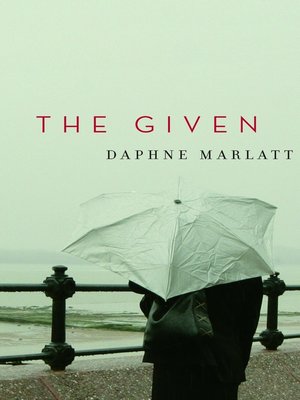
Sign up to save your library
With an OverDrive account, you can save your favorite libraries for at-a-glance information about availability. Find out more about OverDrive accounts.
Find this title in Libby, the library reading app by OverDrive.



Search for a digital library with this title
Title found at these libraries:
| Library Name | Distance |
|---|---|
| Loading... |
Winner of the Dorothy Livesay Poery Prize
Finalist for the Pat Lowther Memorial Award
“You remember — what is it you remember? / the feel of home, that moment of coming into your body. . . ”
So begins Daphne Marlatt’s haunting and multi-layered long poem, which reads with all the urgency and depth of a novel. Set in present-day and 1950s Vancouver, The Given begins with the news of a mother’s death, then opens up to become an intricate tapestry of lives, as Marlatt deftly interweaves the past with the present, replicating the arc of memory itself, while questing for — and questioning — the meaning of home and identity. Circling around the narrator’s mother — theatrical, troubled, imprisoned in the small existence of a 1950s housewife, and a persistent presence in the lives of others — The Given is a ceremony performed for her, and for all “those who have left, who go on burning in us.” In luminous, deeply resonant fragments, Marlatt resoundingly answers the drive to live with deep attention in a now that is, for all of us, “tangled in the past.”
Finalist for the Pat Lowther Memorial Award
“You remember — what is it you remember? / the feel of home, that moment of coming into your body. . . ”
So begins Daphne Marlatt’s haunting and multi-layered long poem, which reads with all the urgency and depth of a novel. Set in present-day and 1950s Vancouver, The Given begins with the news of a mother’s death, then opens up to become an intricate tapestry of lives, as Marlatt deftly interweaves the past with the present, replicating the arc of memory itself, while questing for — and questioning — the meaning of home and identity. Circling around the narrator’s mother — theatrical, troubled, imprisoned in the small existence of a 1950s housewife, and a persistent presence in the lives of others — The Given is a ceremony performed for her, and for all “those who have left, who go on burning in us.” In luminous, deeply resonant fragments, Marlatt resoundingly answers the drive to live with deep attention in a now that is, for all of us, “tangled in the past.”







